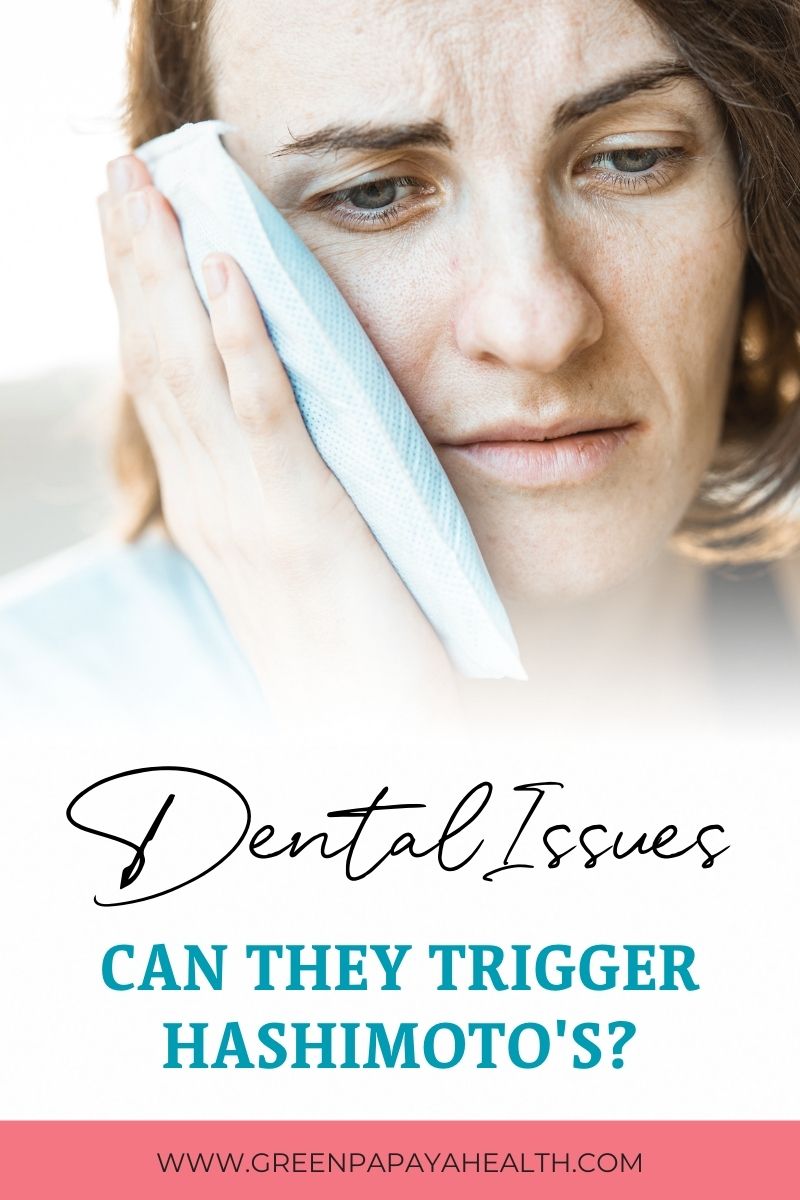The thyroid gland may be located in the neck, but inflammation and infections in other parts of the body — the mouth included — can trigger an autoimmune condition such as Hashimoto’s thyroiditis. After all, the mouth is the first part of the digestive tract and one of the most important, as the oral cavity harbors more than 700 bacterial species that colonize surfaces such as the oral mucosa as well as the soft and hard tissues of the teeth.
When the oral microbiome is disrupted, oral dysbiosis occurs and gum infections such as periodontitis can develop. And if dysbiotic oral bacteria spreads to other parts of the body, gut dysbiosis may also occur. This is why oral infections and other dental issues may trigger Hashimoto’s thyroiditis in many people, especially those of us with increased intestinal permeability.
The Connection Between Dental Health and Thyroid Disease
According to an article published in Reviews in Endocrine and Metabolic Disorders, the thyroid may be sensitive to changes in the gut microbiota. These changes — or even overt dysbiosis — could play a role in the onset and progression of Hashimoto’s disease. Triggers such as fluoride exposure, cavity fillings, and dental bridges could all lead to thyroid inflammation and the development of an autoimmune condition in some individuals.
In my case, I didn’t have any cavities until my 30s, and many of my dental issues started around the time I found out I had hypothyroidism and later Hashimoto’s. Leading up to my diagnosis, I had multiple cavities, gum recession, and a tooth that needed to be pulled as the result of a poorly done filling that was too deep.
When it came time to have my tooth extracted, my biological dentist recommended a bridge in lieu of an implant. Because I have Lyme disease, my dentist was worried my body would reject a dental implant: Something that’s common among those with chronic illness. However, any dental procedure, infection, or oral inflammation can trigger Hashimoto’s in some susceptible individuals — as well as the use of dental materials like bridges, braces, and onlays.
Common Dental Triggers for Hashimoto’s
Now that we’ve discussed the connection between oral health and autoimmune thyroid disease, let’s highlight a few specific dental triggers for Hashimoto’s. According to Dr. Izabella Wentz, these triggers often include the following:
Oral inflammation and infections
As I mentioned earlier, dental infections and inflammation can disrupt the oral microbiome and trigger autoimmune conditions such as Hashimoto’s. Impacted teeth, gingivitis, and tooth abscesses can all lead to dysbiosis of the gut and oral microbiomes.
Periodontitis
Several studies have found a link between Hashimoto’s disease and periodontitis — an infection causing inflammation of the gums. The oral bacteria that causes periodontitis may also contribute to the development of Hashimoto’s thyroiditis and other autoimmune diseases such as rheumatoid arthritis.
Oral surgeries and procedures
Root canals and tooth extractions are some other dental triggers for Hashimoto’s, as these oral surgeries and procedures can cause inflammation, infection, and potentially, autoimmunity. For instance, there’s a risk of developing bacteria-collecting cavitations after a tooth extraction, which could lead to infection.
Infections can also occur after a root canal. And since this type of procedure leaves behind a dead tooth and root, you may not even sense an infection is present.
Silver dental fillings
Also known as dental amalgams, these dental fillings are made up of mercury, silver, zinc, and copper. Mercury toxicity is a common root cause of Hashimoto’s, as the mercury from these dental fillings can accumulate in the thyroid gland and become problematic for some individuals with hypersensitivity to mercury and other heavy metals.
What’s more, a study published in Neuroendocrinology Letters found that the removal of these fillings resulted in decreased anti-thyroid peroxidase (TPO) antibodies and anti-thyroglobulin (Tg) autoantibodies in Hashimoto’s patients with mercury hypersensitivity. As a safer alternative, Dr. Amy Myers recommends replacing any dental amalgams with zirconium or white resin fillings. However, resin-based composites can still be problematic for some individuals.
Dental materials such as bridges and braces
Some individuals, particularly those who are more sensitive to heavy metals and toxins, might experience symptoms of autoimmune thyroiditis following the introduction of dental materials such as plastic aligners, braces, bridges, and onlays. And while eliminating these products and materials isn’t always possible, the key is to work with a biological dentist who can help us to choose options less likely to cause a reaction.
Dental x-rays
Exposure to radiation from dental x-rays doesn’t just increase your risk of developing thyroid cancer: A review article published in Neurology and Preclinical Neurological Studies found that radiation exposure could also trigger Hashimoto’s or even Graves’ disease. The study, however, didn’t look at dental x-rays specifically. Rather, it looked at exposure to radioactive iodine (Iodine-131), external beam radiotherapy (EBRT), and nuclear accidents.
Fluoride
A study published in the Journal of Epidemiology & Community Health looked at drinking water fluoridation in England, finding that those who were exposed to higher levels were more likely to develop hypothyroidism. In areas with fluoride levels of 0.3 mg/l or more, the risk of developing hypothyroidism was 30 percent greater.
Unfortunately, most of us are exposed to fluoride on a daily basis, whether it’s in our drinking water, toothpaste, medications, teas, or canned goods. And not only has excessive fluoride intake been linked to Hashimoto’s, but also cancer, Alzheimer’s, osteoporosis, and kidney dysfunction. It can also worsen periodontitis.
What You Can Do to Protect Yourself (And Your Thyroid)
If you’re prone to dental issues, you may feel as if there’s nothing you can do to care for your teeth and gums while also maintaining good health overall. And while it may certainly seem this way after learning about these common dental triggers for Hashimoto’s, thyroid-proofing your oral hygiene routine is possible. Here’s how to get started:
- Work with a biological dentist.
- Use reverse osmosis water filters to remove fluoride from your drinking water.
- Wear a thyroid shield during dental x-rays.
- Eat a nutritious diet that’s low in flour, sugar, soda, and caffeine.
- Remove any amalgam fillings.
- Practice regular tooth brushing and flossing.
- Use probiotic toothpastes and probiotics (look for fluoride-free dental products).
Whatever your thyroid-related health concerns may be, I can help you to get to the root cause — whether it’s dental procedures, excess exposure to fluoridated drinking water, or food sensitivities. We’ll work together to get you back to feeling your best!
Ready to experience more energy, improved digestion, and a better night’s rest? Schedule your 90-minute Vital You VIP Consult or apply for the Thyroid Reset Method™ today.
Sources:
- https://www.ncbi.nlm.nih.gov/pmc/articles/PMC6503789/
- https://pubmed.ncbi.nlm.nih.gov/30911359/
- https://pubmed.ncbi.nlm.nih.gov/30294759/
- https://thyroidpharmacist.com/articles/dental-triggers-hashimotos/
- Wentz, I. (2017). Hashimoto’s protocol (pp. 349-353). HarperOne.
- https://thyroidpharmacist.com/articles/periodontitis-a-trigger-for-hashimotos/
- https://thyroidpharmacist.com/articles/dental-amalgams-silver-fillings-root-cause/
- https://pubmed.ncbi.nlm.nih.gov/16804512/
- Myers, A. (2016). The thyroid connection (pp. 189-190). Little Brown Spark.
- https://link.springer.com/article/10.1007/s00702-020-02260-5
- https://www.sciencedaily.com/releases/2015/02/150224083811.htm






